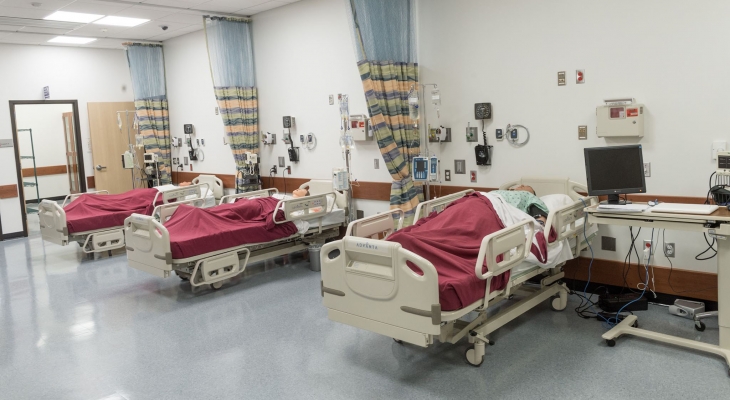
Nursing Program Information Session
JJC has a multitude of resources to make sustainability easy to integrate into your campus life. Save energy by taking the bus to campus. Cool-off in a LEED certified building. Enjoy a meal in our sustainable cafeteria. Take advantage of learning opportunities in one of our many land laboratories. Relax in our unique natural areas.
Did you know that you can reduce your carbon footprint by taking the PACE Bus to campus? See the routes and learn more.
The MakerLab is a place where faculty, students and community members can learn how to use 3D-printing machines, scanners and laser cutting technology.
The Joliet Junior College Lake is a central aesthetic feature of the main campus. The 5.8 acre lake has a 362 acre watershed which includes the college campus; parking lots; wooded, farm and open fields; and residential and commercial developments.
A grant-funded rehabilitation project is underway to restore the natural beauty and ecological health of the JJC Lake. Fertilizers, pesticides and herbicides from surrounding lawns and agricultural fields flow into the lake through storm water runoff. Nutrient-rich sediments accumulate, causing an explosion of plant and algal growth. This depletes oxygen levels, which leads to fish kills. The accumulation of sediment has also reduced the lake's water-holding capacity by 20 percent. The rehabilitation efforts will address these issues with the goal of restoring the quality, health and natural beauty of the lake.
Funding for this project provided, in part, by the Illinois Environmental Protection Agency through Section 319 of the Clean Water Act.
The JJC Lake has been subjected to stress due to urbanization and natural factors. If the lake is not properly managed, or if properties that drain to the lake contribute pollutants, the functions of the lake can be significantly degraded.
Property owners within the lake watershed can actively participate in the preservation of the lake. The following benefits are provided by the lake:
Fertilizers, pesticides and herbicides applied to lawns, agricultural fields, or properties can end up in the lake. These chemicals can be carried during rainstorms in drainage water that ultimately drains into the JJC Lake. These chemicals and nutrients have a significant impact on the quality of the lake, contributing to noxious plant growth, fish kills, and algae blooms and die-offs. Organic sediment deposits have reduced the original lake water volume by 20 percent. Soil eroded during rainstorms also finds its way into the lake. As a result of these factors, the lake depth has been reduced by one to two feet.
The JJC Lake is a living body containing many organisms. When these organisms are in balance, the water quality is good, the lake is clean and attractive, and fish and wildlife habitat are abundant.
JJC Lake is periodically out of balance resulting in excessive algae growth causing:
Lake algae growth can be impacted by watershed land management activities. Following is a typical algae growth cycle:
You can have a significant beneficial impact on lake water quality and appearance. The following actions will make a big difference:
These simple steps will help improve future lake water quality. JJC is doing its part by investigating methods to mitigate problems caused in the past.
The 11-acre arboretum is located on JJC's 368-acre Main Campus, between the entrance and exit roads, adjacent to Houbolt Road at the main gate. It is a place where woody plants, trees, shrubs, and vines are grown for exhibition and study.
The college arboretum concept was originated by Dr. William M. Zales in 1975 as part of a master campus use plan. Upon Dr. Zales's retirement in 1999, the arboretum was renamed in his honor to recognize his contributions. The master plan includes development of nature trails, restoration of native ecosystems, such as the prairie, fen, various stages of forest successional types, soil conservation measures for the agricultural crop land, and management plans for the campus lake.
These continuing projects are managed by the JJC Natural Areas Committee, the Grounds Advisory Committee, and the college's building and grounds staff. In the spring of 2004, the JJC Foundation and Alumni Relations (The Office of Institutional Advancement) and the Natural Area Committee launched a new project called Trees for Tomorrow to raise funds for the continued development and maintenance of the arboretum.
Funds from the Friends of the Arboretum will be used to purchase and plant trees for the arboretum. These outdoor facilities are used and enjoyed by students both in and out of the classroom, as well as by faculty, staff and community members from throughout the district.
Joliet Junior College invites you to become a member of Friends of the Arboretum, which works to improve and diversify the 11 acre arboretum at Joliet Junior College's Main Campus.
The Dr. William M. Zales Arboretum is intended to serve JJC students, faculty, staff, and the community as a unique educational resource. Dr. Zales retired from JJC in 1999 after having served the college for over three decades. The arboretum was named in his honor.
Please help us make JJC's arboretum the living laboratory Dr. Zales intended it to be. We would like to increase the variety of plantings to include more than 200 species belonging to more than 100 genera in approximately 50 families. Our vision is to create a park-like setting with winding footpaths, benches, and educational information about the native and naturalized woody plants growing in the arboretum.
Your tax-deductible donation will allow you to become a member of Friends of the Arboretum and will enable the college to make the needed acquisitions to develop and maintain the arboretum well into the future. Trees will be added to the arboretum in the spring and fall seasons of each year.
To make a contribution, download a donation form and mail it with a check payable to the JJC Foundation.
Your gift to the Trees for Tomorrow project will be recognized on a donor wall located at Joliet Junior College. Thank you for supporting the Dr. William M. Zales Arboretum at Joliet Junior College.
JJC is continuously restoring the campus' natural areas. The ecosystems on campus are remnants of a once vast wilderness of prairie and forest.
Ecological restoration is the process of re-establishing native plant communities and ecological processes of energy flow and nutrient cycling until they become self-sustaining. This is your chance to help preserve our local biological diversity.
During a restoration day we explore and discover the subtle changes taking place on the site, admire the seasonal activities of plants and animals, cut and clear non-native vegetation, plant native seeds and root stocks, and take frequent rests to enjoy our accomplishments. You are encouraged to wear boots, long pants, and durable leather gloves. People of all experiences are invited to attend. We provide the training and equipment for enthusiastic volunteers.
The Horticulture Land Lab is for students to experiment with hydroponics, beekeeping, grape cultivation and other sustainable practices.

